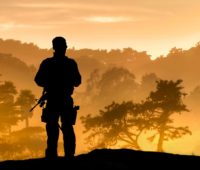Three of the suspects in the attempted bombings in London on 21 July were born in the Horn of Africa. One, Yasin Hassan Omar, was born in Somalia; a second, Osman Hussein, in Ethiopia; and a third, Muktar Said Ibrahim, in Eritrea. Ten years ago, when Osama bin Laden lived in Khartoum, the Horn of […]
Not long after the attacks on New York and Washington on September 11, 2001, the Council launched a website of commissioned essays dealing with the causes, consequences and interpretations of the tragic events. Response to the site was favorable, reminding us that there is strong demand, even in these information-rich days, for careful, reliable and scholarly analysis of contemporary issues. With the launching of the SSRC website Contemporary Conflicts, we have extended coverage to other conflicts in the world besides those directly related to the events of September 11—reaffirming that these, too, merit serious scholarly attention. But coverage has continued on events related—or putatively related—to September 11, as many conflicts in the world have become enmeshed in what until recently was called “the war against terror.”
Review of Gerard Prunier, Darfur: The Ambiguous Genocide, Hurst and Co.
by Alex De WaalAhmat Acyl Aghbash is known to few, and then mostly for his grisly end—he stepped backwards into the spinning propellers of his Cessna aeroplane in 1982. His last words can only be guessed. His legacy is the Janjawiid militia, now infamous for genocidal atrocity in Darfur. The plane was a gift from Libya’s Colonel Muammar […]
Who are the Darfurians? Arab and African Identities, Violence and External Engagement
by Alex De WaalThis paper is an attempt to explain the processes of identity formation that have taken place in Darfur over the last four centuries. The basic story is of four overlapping processes of identity formation, each of them primarily associated with a different period in the region’s history. The four are the ‘Sudanic identities’ associated with […]
Why ‘We’ Lovehate ‘You’
by Paul Smith“The reaction to the events of 11 September–terrible as they were–seems excessive to outsiders, and we have to say this to our American friends, although they have become touchy and ready to break off relations with accusations of hard-heartedness.” ‘We’ and ‘you’ Doris Lessing’s rueful but carefully aimed words, published in a post-9/11 issue of Granta magazine […]
Expert Economic Advice and the Subalternity of Knowledge: Reflections on the Recent Argentine Crisis
by Ricardo SalvatoreAct 1. Taking the master’s speech as proper President Duhalde and Minister Remes Lenicov went to Washington and Monterrey to speak with the key figures in the US Treasury, the IMF and the World Bank. They carried with them a message: that with an impending hyperinflation it was necessary to check the devaluation of the […]
The Role of the United States in the Global System after September 11th
by Dani NabudereIntroduction It is clear that power relations in the global system have been severely tested since the events of September 11, 2001, so much so that it has become fashionable these days for people to argue that the world has irrevocably changed with those events. The terrorist attacks on the World Trade Center in New […]
Anti-Americanism: A Revisit
by Rob KroesI. What “ism” is anti-Americanism? What kind of “ism” is anti-Americanism? Like any “ism” it refers to a set of attitudes that help people to structure their world view and to guide their actions. It also implies a measure of exaggeration, a feverish over-concentration on one particular object of attention and action. Yet what is […]
“Americanization”: An East Asian Perspective
by Akio IgarashiThe unconscious reversal of Americanization For the past few years, American Hollywood war films, such as “Saving Private Ryan”(1998), “The Thin Red Line”(1998), “Stalingrad”(2001), “Pearl Harbor”(2001) and “Black Hawk Down” (2002), have appeared regularly in Tokyo movie theaters. War movies are one of the key genres in Hollywood, and Japanese moviegoers have had the opportunity […]
Colombia’s Conflict and Theories of World Politics
by Ann MasonAmong the multiple critiques of International Relations theory, its limited relevance for understanding the Third World’s place in global affairs has gained increasing attention during the past decade. First, the end of the Cold War revealed a more complex world stage with a plurality of actors, problems and interests that had little to do with […]
Institutions in Turbulent Settings
by Francisco GutiérrezThis paper critiques some applications of the neoinstitutionalist program (NI) to the study of Latin American and Andean polities, and tries to develop some aspects of an alternative framework. The critique develops on two levels. First, the “turbulent” institutions of several Latin American and Andean countries highlight some of the shortcomings of NI tout court. Since […]












